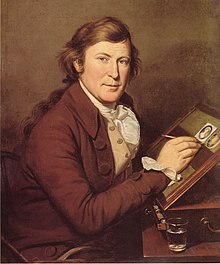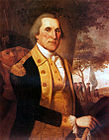James Peale
James Peale | |
|---|---|
 James Peale Painting a Miniature by Charles Willson Peale | |
| Born | 1749 Chestertown, Maryland, British America |
| Died | May 24, 1831 (aged 81–82) |
| Nationality | American |
| Education | Charles Willson Peale |
| Known for | Painting |
James Peale (1749 – May 24, 1831) was an American painter, best known for his miniature and still life paintings, and a younger brother of noted painter Charles Willson Peale.
Early life
[edit]Peale was born in Chestertown, Maryland, the second child, after Charles, of Charles Peale (1709–1750) and Margaret Triggs (1709–1791). His father died when he was an infant, and the family moved to Annapolis.[1]
In 1762, he began to serve apprenticeships there, first in a saddlery and later in a cabinetmaking shop. After his brother Charles returned from London in 1769, where he had studied with Benjamin West, Peale served as his assistant and learned how to paint.[1]
Career
[edit]
Peale worked in his brother's studio until January 14, 1776, when he accepted a commission in the Continental Army as an ensign in William Smallwood's regiment. Within three months he was promoted to captain, and during the next three years fought in the battles of Long Island, White Plains, Trenton, Princeton, Brandywine, Germantown, and Monmouth. He resigned his army commission in 1779, and moved to Philadelphia to live with his brother. (One notable later collaboration, however, was in 1788 to make floats for Philadelphia's Federal Procession in honor of the newly drafted United States Constitution).[2]
At the conclusion of the Revolutionary War Peale was admitted as an original member of The Society of the Cincinnati of Maryland when it was established in 1783.[3]
At the outset of his painting career Peale painted portraits and still-life, and by the mid-1780s had established his reputation. At about this time, however, Charles turned over his own miniature portrait practice to him, and throughout the 1790s and early 19th century Peale devoted himself to miniature painting. Much of this work was watercolor on ivory. In 1795 Peale exhibited a still life of fruit along with nine miniatures and his family portrait at the Columbianum, a short-lived art academy in Philadelphia. Around 1810, as Peale's eyesight began to weaken, he gave up painting miniatures to turn to large portraits and still-life subjects that were greatly admired and widely exhibited in Philadelphia, Boston, and Baltimore.[2]
The total number of Peale's landscape paintings remains unknown, but he executed more than 200 watercolor miniatures on ivory, perhaps 100 still-life paintings, fewer than 70 oil portraits, and at least 8 history paintings.[2]
Personal life
[edit]
In 1782 he married Mary Claypoole (1753-1828), a daughter of James Claypoole and sister of portrait painter James Claypoole Jr., after which he established his own household and artistic career. Together, Mary and James were the parents of seven children, three of whom became accomplished painters in their own right, including:[4]
- Maria Claypoole Peale (1787–1866) also became a painter of still lifes, though of less distinction than her sisters.
- James Peale Jr. (1789–1876), who married his cousin, Sophonisba Peale (1801–1878), daughter of Raphaelle Peale.
- Anna Claypoole Peale (1791–1878), a miniaturist and still-life painter
- Margaretta Angelica Peale (1796–1882), painter of trompe l’oeil subjects and tabletop fruit
- Sarah Miriam Peale (1800–1885), a portraitist and still-life painter
- Jane Ramsay Peale
- Eleanor Peale.
Peale died in Philadelphia on May 24, 1831, and is buried at Gloria Dei (Old Swedes') Church cemetery along with this wife and six children.[1]
Gallery
[edit]-
Still Life, oil on panel painting by James Peale, c. 1824, Honolulu Museum of Art
-
Fruits of Autumn
-
View on the Wissahickon
-
George Washington
-
The Battle of Princeton, 1782
-
The Artist and His Family, 1795. Pennsylvania Academy of Fine Arts
-
Anna and Margaretta Peale
-
The Ramsay-Polk Family at Carpenter’s Point, Cecil County, Maryland
-
The Generals at Yorktown, Colonial Williamsburg Foundation
-
Sir Peter Parker's Attack Against Fort Moultrie, Colonial Williamsburg Foundation
-
The Ambush of Captain Allan McIane, 1803, Utah Museum of Fine Arts
-
Another version by James Peale's painting of encounter between Allan McLane and British dragoons
-
Anna Sophia Alexander Robertson (Mrs. William Theberton), 1816
-
Portrait of William Young, 1817
References
[edit]- ^ a b c Miller, Lillian B. The Peale Family: Creation of a Legacy 1770-1870. Washington, D.C.: Abbeville Press, 1996.
- ^ a b c "Distinguished Painters | James Peale". librarycompany.org. The Library Company of Philadelphia Art & Artifacts. Retrieved 16 May 2019.
- ^ Metcalf, Bryce (1938). Original Members and Other Officers Eligible to the Society of the Cincinnati, 1783-1938: With the Institution, Rules of Admission, and Lists of the Officers of the General and State Societies Strasburg, VA: Shenandoah Publishing House, Inc., p. 246.
- ^ The Claypoole Family
External links
[edit]- James Peale at Find a Grave
- American paintings & historical prints from the Middendorf collection, an exhibition catalog from The Metropolitan Museum of Art (fully available online as PDF), which contains material on Peale (no. 6)
- Union List of Artist Names, Getty Vocabularies. ULAN Full Record Display for James Peale, Sr. Getty Vocabulary Program, Getty Research Institute. Los Angeles, California.
- The Society of the Cincinnati
- The American Revolution Institute
- 1749 births
- 1831 deaths
- 18th-century American painters
- 18th-century American male artists
- American male painters
- 19th-century American painters
- 19th-century American male artists
- Continental Army officers from Maryland
- Peale family
- Sibling artists
- People from Chestertown, Maryland
- Painters from Maryland
- People from colonial Maryland
- Burials at Gloria Dei (Old Swedes') Church














